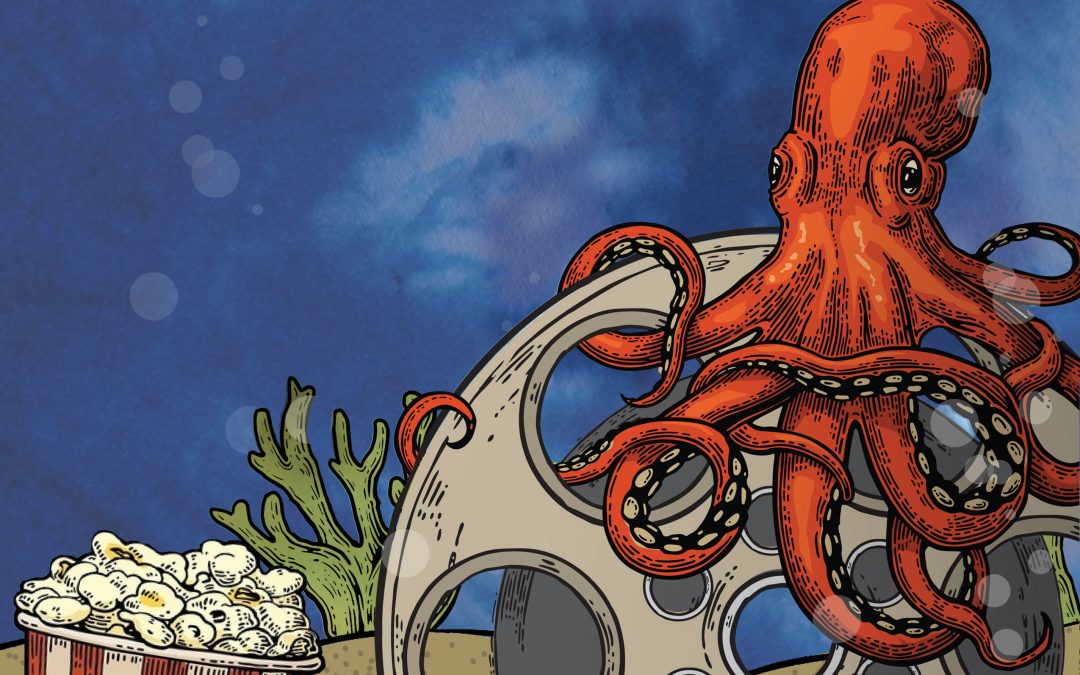By JOANNE BRIANA-GARTNER
Think back.
Think back to a time before digital. Before computers. Before e-mail.
Think back to a time when movies were shown in 35 millimeter—in movie theaters.
Think back to a time when nobody knew what film festivals were.
That is the era the Woods Hole Film Festival started in.
“The festival began for a couple of reasons,” recalled Woods Hole Film Festival executive director Judy Laster. “As a summer kid, I came to Woods Hole every year and helped run the MBL Club with Brian Switzer and Kate Davis and, as part of that, we ran Thursday movie night. All of that, Ms. Laster remembered, required “presentations and promotion and making things happen in Woods Hole.”
“At one point Kate started making feature films; she had made a feature documentary. I had recently graduated from law school and was living in Boston. I started taking classes at Boston Film and Video Foundation and I made a 16-millimeter film—a spaghetti western filmed at the Woods Hole golf course.”
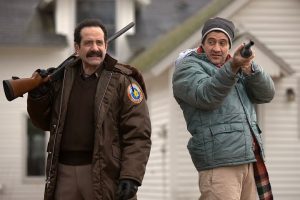
Tony Shalhoub (left) and Ross Partridge in “Feed The Fish,” which screened in 2010
at the Woods Hole Film Festival.
In need of a place to show their films, Ms. Davis reached out to three filmmakers whom she knew in order to add to the two films they already had. “We ended up showing their films, her film and my film, upstairs at the Woods Hole fire station,” said Ms. Laster, “and thus was born the Woods Hole Film Festival.”
“At that time in New England there was only the Boston Film festival and the New York Film festival,” Ms. Laster said. “Festivals weren’t ubiquitous like they are now.”
Describing that first “festival” as fun, Ms. Laster and Ms. Davis decided to keep it going. “We moved it over to Lillie auditorium, and later to a weekend and then to a four-day event.” Eventually they hooked up with the Coolidge Corner Theater in Brookline, a connection that helped with programming the event. “Even though there was a filmmaking community, there weren’t easy ways to reach out to them,” Ms. Laster said. To generate submissions the festival crew would distribute paper fliers appealing for films. “They would send us VHS tapes,” recalled Ms. Laster. “Everything was very tactile then.”
That went on for several years, until the advent of Withoutabox—the first online submission platform for films, which also coincided with people getting e-mails and websites, and from then, Ms. Laster said, “it just skyrocketed. “Something that had started out, not as a joke, but maybe as a lark, all of a sudden turned into something that had a life of its own.”
Thirty years after that first one-hour festival upstairs at the Woods Hole Fire Station, the Woods Hole Film Festival now takes place in multiple venues in and around Woods Hole over the course of eight days and includes talk-backs with filmmakers, workshops, musical events, filmmakers in residence and an internship program. Planning for the festival takes place year-round with staff and volunteers who comprise a screening committee, a tech team, a jury, screenplay readers and more.
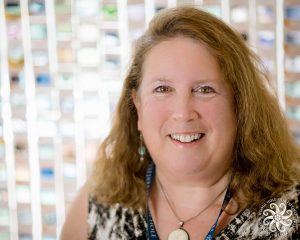
Judy Laster, founder and executive
director of the Woods Hole Film
Festival.
“Over the years we’ve become known as a place where emerging and independent filmmakers can show their work and we’re considered one of the top festivals regionally, if not nationally,” said Ms. Laster. “People seek us out from all over. This year we’ve had film submissions from almost every country in the world.”
Last year the festival, which was virtual due to the pandemic, screened more than 180 films, including shorts, documentaries and feature-length narratives.
This year the festival will take place both in-person and virtually, July 31 through August 7. Out of over 1,000 submissions, the festival plans to screen about 150 films, “probably about 50 features, narrative and documentary, and 100 shorts,” said Ms. Laster. The final selections will be made shortly.
“We hoping to be in-person to the extent possible and then everything is virtual,” Ms. Laster said.
“Our goal for the summer is for the festival to be accessible in many different ways. One is on a virtual platform in which you can do everything and the second is limited in person, and we really hope that people who live here will come to the live and in-person events. We’re going to have it as COVID-safe as possible. All the safety protocols will be observed.”
Presently the plan is to have the majority of the in-person screenings at Falmouth Academy. “That will be our hub this year,” said Ms. Laster. The festival will also host screenings at the Cotuit Center for the Arts. For films that screen in-person, Ms. Laster is hoping the filmmakers will be able to attend.
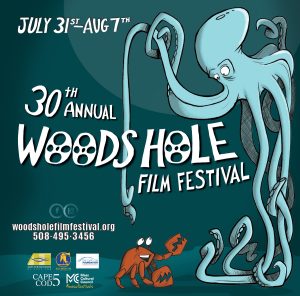 For the online screenings, “this year we want to focus on using the technology to not only bring films to viewers virtually but to also build community,” said Ms. Laster. “We’re looking at options for having a more engaged community experience. We really want it to be participatory.”
For the online screenings, “this year we want to focus on using the technology to not only bring films to viewers virtually but to also build community,” said Ms. Laster. “We’re looking at options for having a more engaged community experience. We really want it to be participatory.”
Surrounded by the Woods Hole Oceanographic Institution, the Marine Biological Laboratory, the National Marine Fisheries Services and other science-based organizations, it is no wonder that the festival has come to have a focus not only on local and New England-based filmmakers, but also on science-based films.
“Every film that we show is something that was made by an independent filmmaker,” said Ms. Laster. “That means that film has been worked on for years, there’s no studios behind it, it’s real people, sacrificing a lot to tell a story. And these are stories that would not be in the world otherwise.”
“The energy that happens during the film festival, it’s like Shangri–La,” said Ms. Laster. “This whole world opens up. We have eight days of unbridled creatively that bring together people in many different ways, and a lot of it is the art of discovery. Most of the people at the festival have never heard of the films that we’re showing. And most of the films will have the filmmakers in attendance. So it allows people to have a connection that they don’t get sitting in a movie theater. There’s also a connection they develop among themselves as an audience. It’s a community experience. You come out of a screening hopefully having been changed in some way.
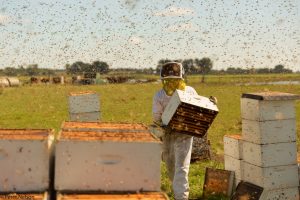
A still from the documentary “The Pollinators,” which screened as part of the Woods Hole Film Festivals Dinner & A Movie series
on March 7, 2020. The last in-person fi lm the festival was able to screen in 2020.
“I’ve had people come back to me years after they’ve seen a film at the festival and tell me how that film changed their life—or saved somebody’s life.”
New to this year’s festival is a programming fellowship. “We’ve had six fellows with us all year, learning how to program a film festival, which has been great,” said Ms. Laster. “We started it because we realized there’s nowhere to learn how to program a film festival; it’s not taught in any school and those of us who have been doing it have been doing it for a long time. We want to make sure there are other people out there who can step in and know how to program a festival.” Ms. Laster said they are planning to keep the program going and to hopefully expand it next year.
In addition to its new programming fellowship, the festival has employed interns for several years. “The purpose of internships,” said Ms. Laster, “is to introduce people to what we do and hopefully give them an overview of what it is to be involved with an event like this.”
Looking toward the future, Ms. Laster said the festival plans to keep streaming options available for viewers. “One great thing about streaming is that unless a film is limited to a particular geographic area, you could be in Hawaii and participating in the Woods Hole Film Festival. If you came here one summer and couldn’t come back because there are no houses to rent, you can still have this as part of your summer.”
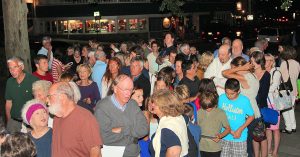
Crowds line up outside Woods Hole Film Festival venues in an earlier year for movie screenings, entertainment, workshops and other
events associated with the festival. This year’s festival will run July 31 through August 7 and will feature virtual and in-person screenings.
In addition to the eight days of the festival, the Woods Hole Film Festival maintains a presence in the community year-round with various screening series such as Dinner and a Movie and Film Falmouth. This past year the festival’s off-season virtual programming has included the Woods Hole Virtual Year-Round Screening Series. Ms. Laster said off-season series allow the festival to present films at a slower pace than the whirlwind of 150+ movies in eight days. “We try to both bring back films that were at the festival in previous years but also to present other independent films that might not have been shown at the festival but are really good films.”
The festival has also taken films into the schools to show to students, inviting filmmakers to come and speak with classes as well. “We were ramping up a collaboration between the festival and Falmouth High School just before the pandemic started,” Ms. Laster said.
When it comes to this year’s festival, Ms. Laster said she hopes that “people give themselves permission to not have that pressure of ‘Are we going to like this?’ Step back, take your time, weave through it, take a chance. Even if somebody doesn’t like a film, you’d better believe they’re going to be thinking about that film at some point in time.”
Passes to the 2021 Woods Hole Film Festival go on sale on June 1. Individual tickets go on sale July 1. Both purchases can be made through festival’s website.

